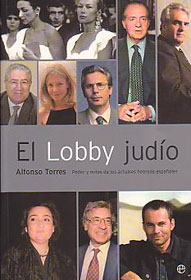Jewish Telegraphic Agency (JTA)
Few Jews in Spain, yet supposed ‘Jewish lobby’ still draws readers
By Jerome Socolovsky
MADRID, Nov. 24 (JTA) –– A new book published in Spain seeks to put to rest the notion that a “Jewish lobby” is influencing government and business in a country that has one of the smallest Jewish communities in Europe.
"The Jewish Lobby: Power and Myths of Contemporary Spanish Jews", by Alfonso Torres. But the book plays into some of the very stereotypes it seeks to deflate.
In “The Jewish Lobby: Power and Myths of Contemporary Spanish Jews,” Alfonso Torres, a Colombian-born journalist who has lived in Spain since 1977, calls on Spaniards to dispense with “old cliches and historical prejudices” about Jews.
Spaniards should know better, he says, because their country was “the cradle of Sephardic Judaism.”
The book comes at a time when anti-Jewish tendencies in Spain are being questioned. An Anti-Defamation League survey recently found that 34 percent of Spanish respondents held anti-Semitic views, one of the highest percentages in Europe.
Another new book, “Anti-Semitism in Spain: The Image of the Jew (1812-2002)” reveals how prejudiced images of Jews lived on for hundreds of years after King Ferdinand and Queen Isabella’s expulsion decree in 1492.
The author, Gonzalo Alvarez Chillida, a history professor at the National Distance University of Spain, calls it “an anti-Semitism without Jews.”
Jews began moving back to Spain after the Inquisition was abolished in the 19th century. Today an estimated 15,000 to 20,000 Jews live in Spain, out of a total population of roughly 40 million.
While meant for a scholarly audience, “Anti-Semitism in Spain” has some fascinating anecdotes, such as how anti-Semitic stereotypes resurfaced when Spain invaded North Africa in the 19th century and came into contact with the descendants of Jews who had fled the Inquisition.
The Jews were once again seen as “avaricious, fawning, servile, cowardly, traitorous, and repugnant physically” — though the invaders “almost unanimously perceived Jewish women as beautiful,” according to Alvarez Chillida.
Ironically, Torres’ book employs some of the very Jewish caricatures he condemns, especially in publicizing the work.
The jacket copy lures the reader with enticing questions about the power Jews wield in Spain.
“It’s worth asking how much power contemporary Spanish Jews wield,” the blurb reads. “Who are the wealthiest and most influential magnates? How have they amassed their fortunes? Which political and financial operations have they been involved in, and through which non-Jewish personalities move the invisible strings that connect them to the highest echelons of the state?”
The author says the idea of a “Jewish lobby” in Spain is “one of the great lies” bandied about by the Spanish media, though he doesn’t give concrete examples.
Much of the recent focus on the topic has been tied to the publication of the book.
Along with an article on the book, the newspaper El Mundo published an “ABC of Jewish Spain.” The list of famous Spanish Jews included movie star Cecilia Roth, who starred in Pedro Almodovar’s Oscar-winning “All About My Mother,” and fur designer Elena Benarroch.
Indeed, “The Jewish Lobby” dwells on the wealthiest and scandal-ridden Spanish Jews, including Jews from abroad who have taken up residence in Spain, despite the author’s caveat that they are not representative of the Jewish community.
The author goes into detail about financier Marc Rich, who received a controversial pardon from President Clinton for racketeering, illegal trading and tax evasion; and real estate magnate Jacques Hacheul, an associate of Mario Conde, a convict from the Banesto bank scandal.
Torres notes Spain’s refusal to extradite Russian media tycoon Vladimir Goussinsky to Moscow following appeals from American Jewish leaders to King Juan Carlos and Queen Sofia, who are said to be personally sympathetic toward Jews and the State of Israel.
Spanish Jews did not react kindly to the book.
“We Jews in Spain deserve better than this book,” said Victorino Cortes of Guesher, a watchdog group for anti-Jewish bias that has its hands full with the Spanish media. “If this journalist is our ‘friend,’ imagine our enemies.”
There “isn’t a single interview with the many other Jews he refers to when he says the great majority of Jews in Spain live anonymously” and modestly, Cortes said.
In the chapter on the Israeli-Palestinian conflict, Torres “dedicates pages and pages about what Israel is doing wrong, but there’s hardly any criticism of Arafat and the terrorist groups,” Cortes said.
The chapter does criticize the reflexive pro-Palestinian attitudes among Spanish politicians and journalists. It also condemns those who “distort history” by comparing the casualties from the Palestinian intifada to the murder of 6 million Jewish “civilians” in the Holocaust.
While it might seem elementary, that distinction appears lost on other intellectuals in Spain and also in Portugal, whose Nobel laureate Jose Saramago compared Israel’s blockade of Ramallah earlier this year to the Auschwitz death camp.
The authors of “The Jewish Lobby” and “Anti-Semitism in Spain” point out that derogatory terms still exist in Spanish dictionaries.
“Sinagoga” not only means synagogue, but also “a place where illicit schemes are hatched.” A “Judiada” is an “action that is ill-meaning or unjustly undertaken against a person.”
Torres adds an appendix with more than 5,000 common Spanish surnames believed to derive from family names taken by conversos, Jews who chose to stay in Spain and convert to Christianity rather than be killed for their faith.
“By casting about anti-Semitic dispersions, we are throwing stones at our own glass houses,” he writes.
|
Races? Only one Human race United We Stand, Divided We Fall |
 |
No time to waste. Act now! Tomorrow it will be too late |
|



































